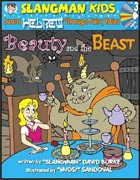This picture book, illustrated in deep vibrant colors with atmosphere, spirit, and a richly developed sense of time and place, tells the story of the re-emergence of Hebrew as a modern, spoken, living language but it tells it poignantly, personally and sweetly through the eyes of a child whose life was affected and shaped by a radical experiment conducted by his father, Eliezer Ben-Yehuda, who was the driving force behind the revitalization of this ancient language for modern times. Eliezer Ben-Yehuda decided to bring up his son using Hebrew as the only language the child was permitted to speak or hear; a challenging, complicated childhood for young Ben-Zion, as no one else at all, anywhere in the world spoke modern Hebrew. They couldn’t speak the language as Ben-Zion’s father was still in the process of developing it. Even ancient Hebrew was considered holy by those around him and inappropriate for everyday use. Therefore, Ben-Zion was unable to communicate with anyone at all except for his own parents, resulting in loneliness and confusion although the aim of his parents was one of higher purpose rather than the isolation they caused.
Michelson takes the reader on a language journey showing us all how new words develop logically and systematically. Ice cream becomes glida based on an ancient root word for freezing. Dictionary becomes milon based on older terms for ““place”” and ““words””. Using similar thought processes, offanayim becomes bicycle and bet-hasefer becomes school. These words didn’t exist in ancient Hebrew because the items or concepts didn’t exist at that time and had to be developed in response to things occurring in the modern world. The new words would not be absorbed into society if they did not make sense so linking them to logical roots and previous concepts was important. The reader gets a good glimpse into how language develops roots and continues to grow.
Ben-Yehuda started teaching his language first to his son and then to other children and then the other children started teaching it to their parents and eventually the new/old language flourished and spread. By the time Ben-Zion was older, there were many people with whom he was able to communicate and share his ideas and who understood his language.
An extensive author’s afterword gives more information about the Ben-Yehuda family and explains where the author took some liberties with strict historical fact while keeping to the accurate historical spirit. He tells a bit more about the life of Ben-Zion as an adult when he was known by the name of Itamar Ben-Avi and discusses some of his accomplishments. He also educates the reader more thoroughly about the development of the Hebrew language.
Highly recommended for ages 5 – 10.
Michal Hoschander Malen is the editor of Jewish Book Council’s young adult and children’s book reviews. A former librarian, she has lectured on topics relating to literacy, run book clubs, and loves to read aloud to her grandchildren.




